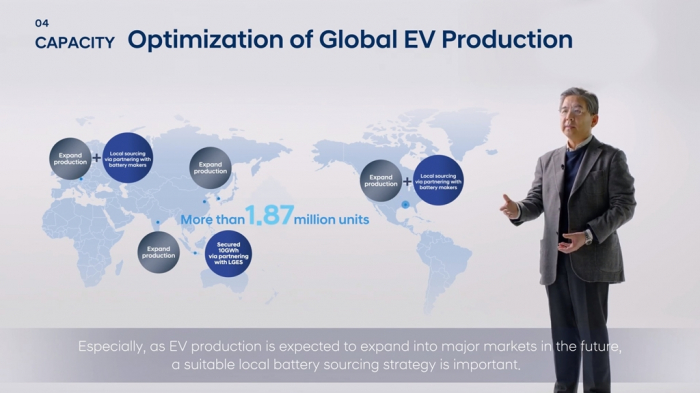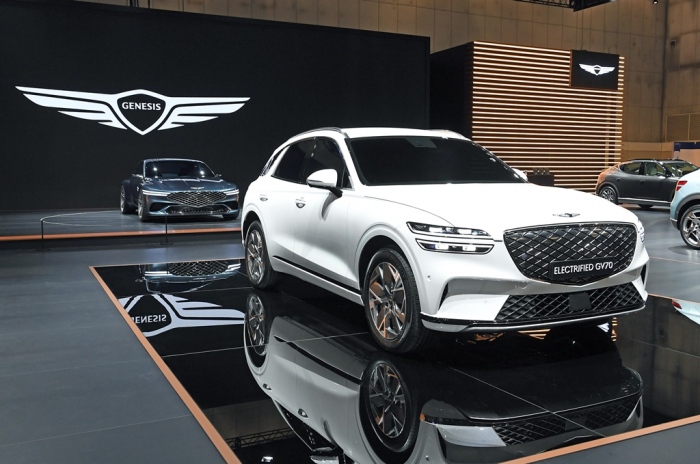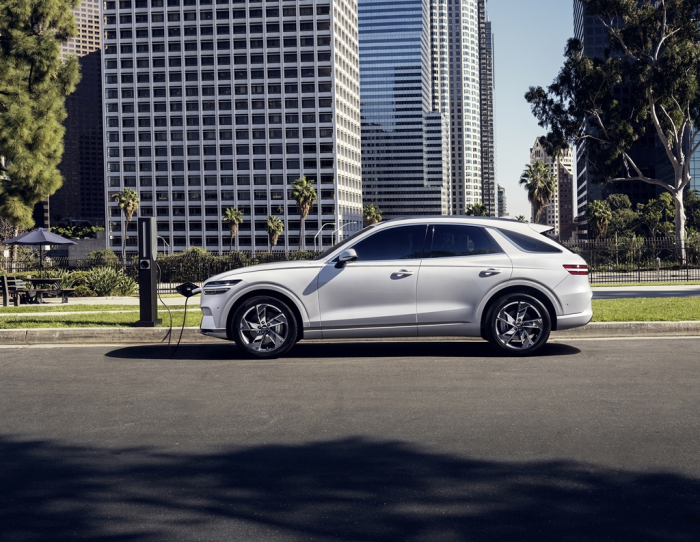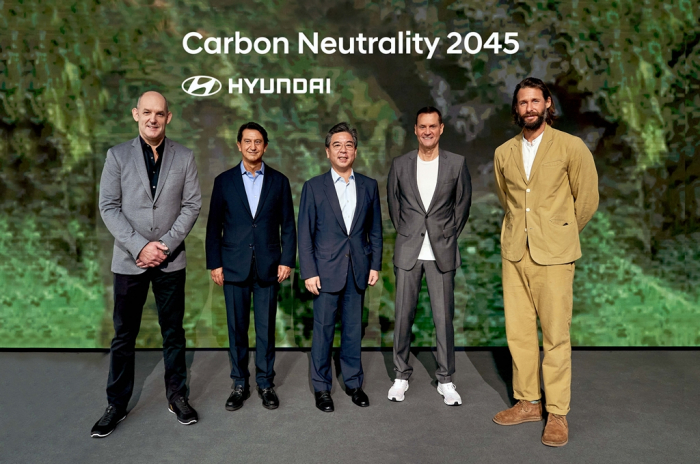Electric vehicles
Hyundai accelerates electrification strategy, targets 7% of EV market
The carmaker also plans to build a new EV production facility and introduce dedicated EV architecture
By Mar 02, 2022 (Gmt+09:00)
4
Min read
Most Read
LG Chem to sell water filter business to Glenwood PE for $692 million


KT&G eyes overseas M&A after rejecting activist fund's offer


Kyobo Life poised to buy Japan’s SBI Group-owned savings bank


StockX in merger talks with Naver’s online reseller Kream


Meritz backs half of ex-manager’s $210 mn hedge fund



South Korea’s top automaker Hyundai Motor Group on Wednesday set out its vision to become a top-tier eco-friendly auto brand by accelerating its electrification strategy, including building a new electric vehicle production facility.
The automotive group, which has the country’s two largest carmakers – Hyundai Motor Co. and Kia Corp. – also announced an ambitious investment plan to spend 95.5 trillion won ($79 billion) in EVs and other future mobility projects by 2030.
At its 2022 CEO Investor Day forum held online, Hyundai Motor Chief Executive Chang Jae-hoon unveiled its midterm electrification roadmap as well as financial and sales targets, as the company pursues sustainable growth as the world’s fourth-largest car manufacturer.
Under the plan, Hyundai aims to boost its annual global battery electric vehicle (BEV) sales to 1.87 million units by 2030 from 140,000 cars in 2021, and more than double its global EV market share to 7% from 3% over the same period.
With EV models from Kia included, the group’s 2030 market share target will rise to 12% from a combined 6%, it said.
The company said it plans to introduce 17 BEV models – 11 Hyundai models along with six models from the Genesis luxury brand – by 2030 to expand its electric vehicle offerings.
New models will include three sedans, six SUVs, one light commercial vehicle as well as one new type model, according to Hyundai. As part of the launch plans, the company will start sales of the IONIQ 6 this year, followed by the IONIQ 7 in 2024.

For the Genesis brand, the BEV lineup will consist of two passenger cars and four SUVs, including the Electrified GV70 set to launch this year. Starting in 2025, all newly launched models from Genesis will be electrified, it said.
“Hyundai is accelerating its transition to electrification to become a global leader in the EV market despite a challenging business environment caused by the global chip shortage and the ongoing pandemic,” said Chang.
NEW DEDICATED BEV PRODUCTION FACILITY
To boost its battery electric vehicle production capacity, Hyundai said it is considering adding a new dedicated BEV facility.
Hyundai didn’t specify the location of the new plant, but industry watchers said the US, one of the world’s largest EV markets, is the most likely candidate.
Besides its EV production facilities in Korea and the Czech Republic, the company also plans to expand its manufacturing bases, starting with an Indonesian plant that recently started operation. The Indonesian factory will start mass production of battery EVs by year-end.
With the expansion of its EV facilities, Hyundai is also striving to ensure stable procurement of batteries by diversifying its supply sources.

It said it aims to secure 170 GWh of batteries for its models, including Genesis cars, by 2030.
Regarding the next-generation batteries, such as all-solid-state batteries (ASSBs), Hyundai said it is cooperating with various global partners to improve energy density and cost efficiency.
NEW MODULAR ARCHITECTURE TO UPGRADE E-GMP
Hyundai said it plans to introduce a new EV platform, called the Integrated Modular Architecture (IMA) -- evolved from its current dedicated EV platform, the Electric-Global Modular Platform (E-GMP) -- by 2025.
The IMA will be utilized not only as Hyundai’s passenger BEV platform but also as its exclusive purpose-built vehicle (PBV) platform, helping to streamline production processes and reduce costs, it said.
Unlike the existing BEV development system, which has different types of battery packs for each model, the IMA will be equipped with standardized battery packs, thus improving cost efficiency, according to Hyundai.
The innovative architecture is expected to boost new Hyundai electric vehicles’ range by as much as 50%, it said.

FINANCIAL GOALS
At Wednesday’s forum, Hyundai also presented its mid-to-long-term financial goals.
By 2030, Hyundai Motor targets an operating profit margin of 10% or higher from its EV business.
To achieve the goal, the company plans to invest 95.5 trillion won in its future businesses, including 19.4 trillion won for electrification and 12 trillion won for software capabilities, by 2030.
According to its annual guidance announced earlier this year, the top Korean automaker projects a revenue increase of 13-14% and an operating profit margin of 5.5-6.5% for 2022.
It aims to sell over 4.3 million cars globally this year, up 10.5% from last year.
Meanwhile, Hyundai Motor Group said on Wednesday the two automaking units’ combined US sales totaled 105,088 vehicles in February, up 6.4% from a year earlier, despite the prolonged pandemic and chip shortages.
Hyundai Motor's US sales, including Genesis models, jumped 10% to 55,906 units, while Kia's sales climbed 2.3% to 49,182 vehicles.
Write to Il-Gue Kim, Hyung-Kyu Kim and Byung-Uk Do at Black0419@hankyung.com
In-Soo Nam edited this article.
More to Read
-
 Electic vehiclesHyundai, Kia refine profile with accolades, higher global rankings
Electic vehiclesHyundai, Kia refine profile with accolades, higher global rankingsMar 02, 2022 (Gmt+09:00)
5 Min read -
 AutomobilesHyundai to take fresh crack at Japan market with online EV sales
AutomobilesHyundai to take fresh crack at Japan market with online EV salesFeb 08, 2022 (Gmt+09:00)
3 Min read -
 Electric vehiclesHyundai launches electrified GV70’s global premiere in China to boost sales
Electric vehiclesHyundai launches electrified GV70’s global premiere in China to boost salesNov 19, 2021 (Gmt+09:00)
2 Min read -
 Electric vehiclesGenesis goes green as Hyundai Motor accelerates EV push
Electric vehiclesGenesis goes green as Hyundai Motor accelerates EV pushSep 02, 2021 (Gmt+09:00)
3 Min read
Comment 0
LOG IN


